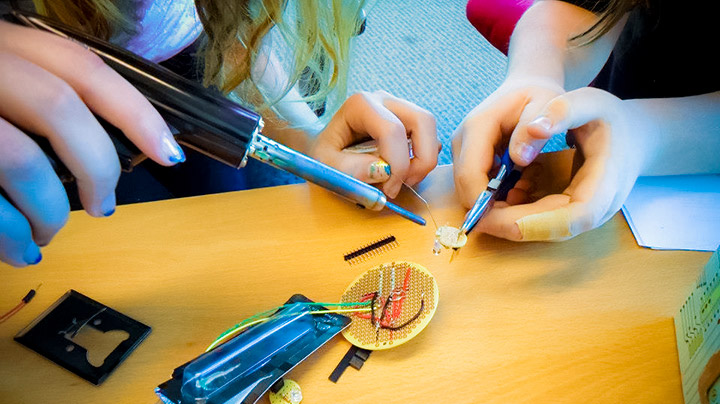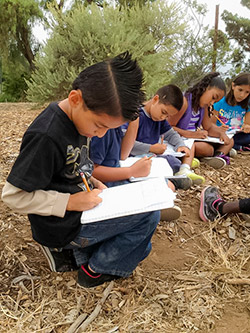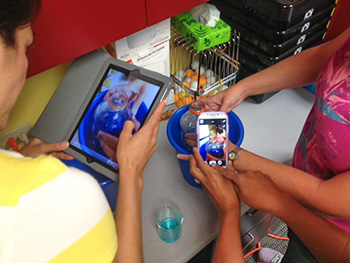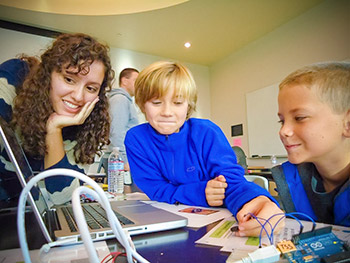
By:
- Inga Kiderra
Published Date
By:
- Inga Kiderra
Share This:
A Lever for Local STEM Education
STEM Success Initiative aims to gather community, university resources to lift region’s K-20 education in science, technology, engineering and math

The CREATE team is working hard to network, leverage and multiply existing resources to improve STEM education throughout San Diego.
“It’s basic physics: You can only lift a small rock above your own head, but if you press a lever you can move a giant boulder,” says Mica Pollock, professor of education studies in the UC San Diego Division of Social Sciences and director of the Center for Research on Educational Equity, Assessment and Teaching Excellence (CREATE).
Pollock is referring to the work of CREATE’s recently launched STEM Success Initiative. Funded in July by the Offices of the Chancellor and Executive Vice Chancellor, the initiative seeks to network UC San Diego’s resources to the education community’s, to collectively improve K-20 STEM – or science, technology, engineering and mathematics – education throughout the San Diego region.
That metaphor of a lever comes up a lot when Pollock and her colleagues talk about the initiative’s main M.O. So does a metaphor that relies on a basic operation in arithmetic: multiplication. The CREATE team charged with realizing the initiative’s goals has been working hard to leverage and multiply existing resources and expertise “to produce maximum supports for high-need students and their teachers.”
UC San Diego and our region more broadly, Pollock explains, are well known for strength in STEM. And there are numerous STEM pipeline outreach efforts already underway. But what’s been missing and needed is coordinated and systematic action to spread learning opportunities and to plug “leaks” in the K-20 pipeline to STEM skills, degrees and careers.

This summer’s Earth Lab experience for Chollas Mead elementary students included fieldwork and writing about their observations in their science notebooks.
The STEM Success Initiative is not meant to replace any current efforts, Pollock said, but rather to “facilitate their integration, improvement and collective impact.”
In the few months since the initiative’s launch, the CREATE team has already met with partners and potential partners for nearly 300 consultations. The campus consults have included faculty, staff and students from the Jacobs School of Engineering, Calit2's Qualcomm Institute, the School of Medicine, Extension, and the divisions of Physical, Biological and Social Sciences, among many other UC San Diego entities. Community groups working with the initiative include the San Diego County Office of Education, the San Diego Rotary Club and numerous K-12 schools.
Consultations range from simple information sessions about the STEM Success Initiative to evaluation of outreach service and collaborative grant writing. About a third of the sessions have focused on program design: where, when, how and with/for whom to create, redirect or expand STEM outreach.
In the case of Neal Devaraj, assistant professor of chemistry and biochemistry and bioengineering at UC San Diego, CREATE helped him write the outreach portion of a successful NSF CAREER grant and helped him turn the lab’s work – developing synthetic cells and studying how the very first biological cells may have spontaneously formed from simple chemicals – into interactive lessons for high school students. The result is a Hands-On Lab course through Education Studies that saw, in the Fall of 2013, Devaraj’s graduate students and STEM undergraduates working together with 35 Upward Bound students from Claremont, Mission Bay and Hoover high schools.
Devaraj is enthusiastic about the opportunity to engage high school students from underrepresented backgrounds with his subject. He is also grateful to be reminded of the importance of public impact. “We researchers often get isolated in our lab, working on a topic for peers. Sometimes we lose sight of what the public is gaining from our work,” he said. “One of the nice aspects of having this [outreach] component is that it forces you to think about that and get other people excited about the research.”
Also in the Fall of 2013, a new two-unit Math Tutor Corps course – developed by CREATE in partnership with Eleanor Roosevelt College – sent math tutors to Lincoln High School. The ERC students were taught how to tutor mathematics by some of the county’s best high school math teachers (recipients of the Math for America San Diego master teaching fellowships) and gained valuable real-world skills while assisting with algebra and intermediate algebra classes at Lincoln, courses where the greatest need exists.

CREATE’s STEM Success Initiative supports hands-on professional development for local educators.
Making matches of mutual benefit between UC San Diego professors, staff and students and local schools, teachers and students is both a focus and a major point of pride, according to the CREATE team.
“We are always listening on- and off-campus to figure out how to design learning opportunities for all involved,” Pollock said, “with the ultimate goal of matchmaking based on pipeline needs.”
Among its many matchmaking successes, the initiative also counts connecting ThoughtSTEM, a company formed by three UC San Diego PhD students, with Gompers Preparatory Academy in Southeast San Diego. CREATE helped ThoughtSTEM, which introduces and teaches computer programming to students ages 8 to 18, to pilot an after-school program at Gompers. The weekly class seats 20 and is free to the Gompers students.
ThoughtSTEM co-founder Sarah Esper, a doctoral candidate in computer science and engineering, said that CREATE not only made the initial introduction to Gompers, a UC San Diego partnership school, but has been offering useful feedback and perspective along the way. Plans for the future, she said, include collaborating with CREATE on assessments of ThoughtSTEM’s after-school workshop and its effects on math, problem-solving and persistence skills.
Because education research suggests that investing in teachers is particularly important, Pollock said, the initiative team has also been making it a priority to involve and support local teachers in ways most valuable to them.
As one example, she cites the initiative’s recent collaborations with the Scripps Institution of Oceanography at UC San Diego. Working together, CREATE’s San Diego Science Project leaders and Scripps Education Alliances Director Cheryl Peach enabled six local high school physics teachers and six biology teachers, including several from the Department of Education Studies’ Noyce Master Teacher Fellowship program, to engage directly with the research of Scripps scientists Ken Melville and Greg Rouse. Out of their self-designed professional development experience – which was up-close and hands-on (and a far cry from the usual lecture by PowerPoint) – the teachers developed dynamic lessons for their classrooms. The group plans to share the lessons, aligned with Next Generation Science Standards, online in collaboration with the San Diego County Office of Education.

The STEM Success Initiative will plug “leaks” in the K-20 pipeline to STEM skills, degrees and careers.
Two CREATE-based groups, in partnership with Groundwork San Diego, were also key contributors in this summer’s professional development of teachers in literacy and hands-on science at Chollas Mead Elementary School and the Earth Lab, a new community greenspace being developed as a site for outdoor, intergenerational learning in Southeastern San Diego.
Pollock is careful to note that these are just a handful of examples and only some of the ways that the CREATE STEM Success Initiative team has been trying to make a difference – so far. There are many other possible models for collaboration, Pollock said, and the team welcomes any and all inquiries.
The core team from CREATE includes Susan Yonezawa, associate director for the center and the initiative’s network coordinator; Cristina Trecha, head of the San Diego Science Project and science outreach coordinator for the initiative; Barbara Edwards, Math for America San Diego head and math outreach coordinator for the initiative; and Larry McClure, the initiative’s research coordinator. To learn more, visit the group’s web page.
Share This:
You May Also Like
Stay in the Know
Keep up with all the latest from UC San Diego. Subscribe to the newsletter today.


